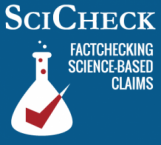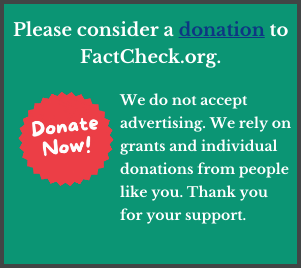
Este artículo estará disponible en español en El Tiempo Latino.
In an interview on NBC’s “Meet the Press,” Sen. Markwayne Mullin, a Republican from Oklahoma, misleadingly suggested that vaccines might cause autism because “there’s not been a direct study on each individual vaccine.”

While he’s technically right about the studies, multiple vaccines and ingredients have been extensively tested, turning up no credible links. Moreover, research shows autism begins to develop well before any childhood vaccines are given.
Mullin’s comment came in a Nov. 17 exchange with host Kristen Welker, who asked if Robert F. Kennedy Jr.’s views on vaccines were a “deal breaker” in confirming Kennedy as President-elect Donald Trump’s pick to lead the Department of Health and Human Services. Kennedy, as we have written, is a vocal advocate against vaccination and co-founder of the anti-vaccination group Children’s Health Defense.
“No, I absolutely appreciate Bobby Kennedy taking a hard look at the vaccines,” Mullin replied, adding that he found Kennedy, a lawyer, “extremely intelligent when it comes to this stuff” and that “some of the stuff does raise a lot of questions.”
Noting that Mullin had previously said vaccines are safe and effective, Welker again asked Mullin whether he was concerned about Kennedy as HHS secretary. (On multiple occasions, Mullin has called the COVID-19 vaccines safe and effective, although he has opposed workplace and military vaccine requirements.)
Mullin, Nov. 17: I have said that there’s some positives to vaccinations. I’ve also questioned vaccines multiple times. And I think they should be questioned. For instance, why is America highest in autism? What is causing that? Is it our diet? Or is it some of the stuff we’re putting in our children’s system? We used to be — used to be almost not even heard of, then it went from 1 to 10,000, and then 1 to 5,000 and 1 to 2,000. In some races right now, 1 out of every 36 kids by the age of 3 had developed some form of autism. What is causing that? And if it is the vaccines, there’s no — nothing wrong with actually taking a hard look and finding, is that what’s causing it. Is it something else that we’re putting in our systems? We do know we’re not as healthy as we should be right now. We’re the most developed country in the world, so all things should be on the table. And if that’s scrutinizing vaccinations, then that is exactly where we need to go.
Welker: Senator, I just have to say, no credible expert or study has shown a link between vaccines and autism. So I just want to be on the record with that. Very quickly, though, because we’re almost out of time –
Mullin: Exactly. But when we ask about the studies for the vaccines, Kristen – I know, but when we ask about the vaccines and the study that was done specific for autism, it’s extremely vague. And in fact, there’s not been a direct study on each individual vaccine if it has the possibility of causing it. They have an overall reaching view. And I ask these questions because I sat on health [committees] in the House and on the Senate. And we have got almost no answers on that.
We contacted Mullin’s office, asking which vaccines should be tested, what was “vague” about the studies and what might have been said — or not — in Congress, but did not receive a reply.
No Link Between Vaccines and Autism, Lack of Biological Plausibility
Contrary to Mullin’s suggestion that scientists haven’t taken “a hard look” at vaccines as a possible cause of autism, there is an extensive body of research refuting any link.
Much of this work has focused on the MMR, or measles, mumps and rubella, vaccine, as this vaccine was the first proposed — fraudulently, as it turned out — to be possibly connected to autism.
But other work has centered on ingredients such as thimerosal, a mercury-containing preservative that was once in several childhood vaccines. Yet other work has examined whether childhood vaccines collectively are associated with autism or similar conditions. Time and time again, scientists have not found any credible links between vaccines and autism.
It’s true, then, that not all vaccines have been individually investigated for a potential role in autism. But citing that is a flawed and misleading argument that misconstrues the current understanding of autism and the scientific process. (Some vaccines, such as the COVID-19 or HPV vaccines, have not been tested with respect to autism because they are too new or are given later in life to be possibly related to the condition.)
“You can’t test all vaccines for all things all the time,” Dr. Paul A. Offit, a vaccine expert at the Children’s Hospital of Philadelphia, told us, adding that scientists need to work off of some kind of biological plausibility.
He called Mullin’s premise “false.” People opposed to vaccination, Offit said, often default to such claims since it’s always true that there’s some variable that hasn’t been tested. “It’s their whack-a-mole strategy,” he said.
Notably, when U.K. gastroenterologist Andrew Wakefield proposed in a 1998 study that the MMR vaccine might be causing autism via intestinal inflammation, it seemed plausible enough for scientists to investigate. Autism symptoms frequently became apparent around the time an MMR dose was given, which led some to wonder if it could be the cause.
Wakefield’s study, however, which included just 12 patients and no control children who hadn’t been vaccinated, didn’t prove anything and was flawed (and later retracted). Scientists also learned that even though autism cannot always be diagnosed until later, subtle indications of the condition occur prior to the first MMR dose at 1 year.
In any case, researchers went on to rigorously evaluate whether there was any relationship between the MMR vaccine and autism. In many cohort and case control studies, including several very large studies in different parts of the world, scientists found no associations between the receipt of the measles or MMR vaccine and an increased risk of autism, even in children at increased risk of the condition. Wakefield was later exposed as having faked the original data that had given rise to the initial concern and stripped of his medical license.
Attention then moved to the possibility that the small amounts of mercury in thimerosal — which was never present in the MMR vaccine, but was in numerous other childhood vaccines — could be related to autism. That’s despite the fact that the preservative had been used for decades and the type of mercury it contains is different from the kind that can be toxic when it accumulates in fish and the environment. Numerous studies, covering vaccines that protect against hepatitis B, Haemophilus influenzae type B (Hib), influenza, and diphtheria, tetanus and pertussis — in children and in pregnant people — proceeded to show no association between thimerosal versus non-thimerosal vaccines and autism or higher or cumulative doses of mercury or thimerosal and autism.
Unrelated to concerns about autism, the U.S. began removing thimerosal from childhood vaccines in 1999 as a precautionary measure. Despite this, autism rates have continued to soar. This is yet more evidence that the preservative has nothing to do with autism.
Arguments that vaccines in some other way could cause autism then morphed to the idea that too many vaccines might overwhelm the immune system and trigger autism in at-risk children. Although there isn’t a good scientific basis for this notion, scientists once again conducted studies to address these concerns, finding no link between vaccination and autism. A 2013 study, for example, found that increasing exposure to immune-stimulating substances in vaccines during the first two years of life was not associated with an increased risk of autism. A 2010 study similarly found no neuropsychological benefits to 7- to 10-year-old children who delayed or skipped their recommended vaccines in their first year, compared with kids who received them on time.
After so much testing of vaccines under a variety of potential hypotheses, it’s unclear what more testing would reveal.
Dr. Peter Hotez, a professor and dean of the National School of Tropical Medicine at Baylor College of Medicine who develops low-cost vaccines for developing countries and has a daughter with autism, told us in an email that “the studies showing no links between vaccines and autism can be expensive and take years to demonstrate the absence of a link. … As a result these studies tend to only be done in response to a specific assertion.”
Testing each vaccine, he added, “would likely cost American taxpayers tens of millions of dollars to show a negative result, when the money is better spent on the neurodevelopmental biology of autism or what parents really need, which is support for their families.”
Beyond the many studies that have evaluated vaccines, scientists’ understanding of autism has also grown in the intervening years, making it implausible that childhood vaccines could cause the condition.
“We now know that the neurodevelopmental processes leading to autism begi[n] in early fetal development, well before a child ever receives a vaccine,” Hotez said, noting that autism is primarily genetic in origin. He is the author of a book that relates his experience with his daughter and explains why vaccines do not cause autism.
Offit noted, too, that even if individual autism-focused studies have not been done for each vaccine, all vaccines are monitored for possible side effects through various vaccine safety surveillance systems. This has successfully identified several serious side effects, he said, which invariably occur soon after vaccination, “at the time when your immune response to the pathogen with the vaccine is at its greatest.”
Autism Prevalence
As for Mullin’s concern about the rising prevalence of autism, as we’ve explained before, researchers are not even certain there is much of a true increase in the condition. In the 1960s and ’70s, several studies pegged the autism rate to be around 1 to 5 per 10,000 children — far lower than the Centers for Disease Control and Prevention’s 2020 estimate of 276 in 10,000, or 1 in 36. But the older studies used much more limited definitions of the condition. The rising rate of autism is largely thought to be due to better detection over time and changes in autism’s clinical definition.
Mullin also incorrectly suggested that a high frequency of autism is unique to the U.S. Climbing autism rates are a global phenomenon. And although no data exist that make direct comparisons possible, a number of countries have similar, if not higher, reported rates.
A census in Northern Ireland, for example, found as many as 5.0% of schoolchildren had an autism diagnosis in 2022-2023 — more than the 2.8% in the U.S. in 2020. A 2022 systematic review of various studies around the world also found higher rates of autism in places such as Japan, Iceland, Nigeria and Australia than in the U.S. — although again, none of these figures should be directly compared. Scientists think most of the difference in autism prevalence between countries comes down to different methodologies, awareness and cultural factors.
Editor’s note: FactCheck.org does not accept advertising. We rely on grants and individual donations from people like you. Please consider a donation. Credit card donations may be made through our “Donate” page. If you prefer to give by check, send to: FactCheck.org, Annenberg Public Policy Center, 202 S. 36th St., Philadelphia, PA 19104.
The post Sen. Mullin’s Misleading Vaccine Testing Claim appeared first on FactCheck.org.
This post was originally published on FactCheck.org.
